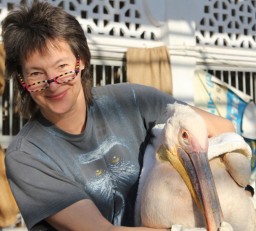WVI vet helps birds injured at Indian kite festival
04/04/2013
“There’s a pelican lying in the operating theatre on the table in front of me and it is absolutely huge!” Johanna was there for Wildlife Vets International at the request of the Jivdaya Charitable Trust to help with the many thousands of birds injured, maimed and killed every year during the Hindu festivals of Uttarayan and Makar Sankranti. For centuries these festivals have gone hand in hand with the act of flying colourful kites in the Western State of Gujarat. “Sadly, no one seems to have briefed the bird population flying around Gujarat that their skies will be criss-crossed by thin cutting strings everywhere for weeks to come,” says Johanna in a full report of her time in India. Johanna, who runs an exotics bird and reptile clinic in Halifax, saw for herself the carnage caused by thin cotton string covered in “manja”, gelatinous, brightly coloured “goo” that contains finely ground glass powder, designed to cut opponents kite strings. “Even worse is the newer stronger nylon with improved cutting properties from China, which never tears. Almost all the birds we saw had flown into kite strings with the front edge of their wing” Early estimates were that some 2,000 birds were treated for injuries during her stay, although casualties appear for weeks afterwards, with around 67% expected to recover enough to go back to the wild. Her visit was partly to give assistance, but more to look at the big picture, spot weaknesses in the bird clinic operation and suggest improvements to the way things are handled to increase the percentage of birds successfully returned to the wild She paid tribute to the many volunteers, from an eminent Indian scientist specialising in crane migration, a famous Indian wildlife photographer, a software student and a housewife who worked round the clock to save all shapes and sizes of birds from vultures to kites, cranes, parakeets, falcons, owls, peacocks… and pelicans. The huge pelican, whose story runs through Johanna’s report, weighed 9.3 kilos and illustrates the tragedy suffered by many. “It has not only cut through the protective wing plumage, the tendon and all other soft tissue in front of the bird’s wing bones, but, the string has also severed larger blood vessels and become ensnared in the distal wing bone,” she wrote. A 1mm wide hole through three quarters of the radial bone indicated how the “snared” pelican had finally escaped. In fact the pelican had been lucky, she says. “Others have an entire wing chopped off by the kite string, which acts not much differently from a cheese cutter. Others break wings while descending and die, or they become amputees, some even double amputees. Crippled birds were found homes for in sanctuaries and Bird Gardens. No bird was euthanased, on religious grounds. Jivdaya’s bird clinics were in a huge, old cattle-holding compound, staffed by around 150 volunteers and 40 staff. With three operating theatres and a rigorously efficient triage and stabilisation system, the colour of India shone through. Brightly coloured shopping baskets (with lids to deter market pickpockets) were housed injured birds. All were fitted with a calming sock on their heads from big sacks full of freshly-washed, donated, socks. “I will never again look at single socks emerging from my washing machine with the same eyes,” says Johanna. The open door atmosphere was typified a stunningly beautiful Indian lady in a striking red sari walking around with a young Hanuman langur (monkey) holding on to her hair, one of the many orphan monkeys she looks after. The bloodbath is not restricted to birds. Cut string falling to the ground can fall in front of bike or motorbike drivers, who get their throats cut and get badly injured or even die. Others die after falling from roofs while flying their kites. But back to the pelican… “Tomorrow he will receive fresh fish from the market and if he does not recognise it as food, because as a wild bird he is not used to eating dead fish, then we will restrain him and force-feed him. “I think that he will make a full recovery and will successfully return to the wild. He is one of the lucky ones!”
.png)
.png)

.png)
.png)







.png)






.png)
.png)




.png)


